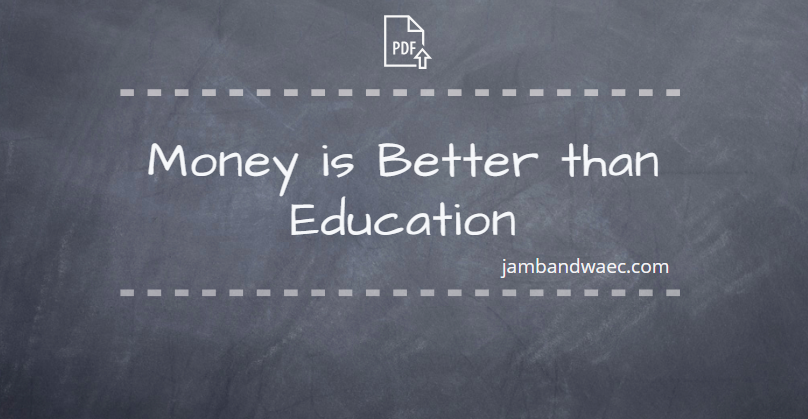In a world driven by ambitions and aspirations, the age-old debate of whether money holds more value than education continues to captivate minds. The juxtaposition of financial wealth and intellectual growth has sparked discussions across various platforms. But is it truly possible to determine if money is superior to education, or vice versa? In this comprehensive article, we unravel the complexities of the “DEBATE TOPIC: Money is better than Education,” examining different viewpoints, considering real-world scenarios, and providing valuable insights.
DEBATE TOPIC: Money is Better than Education
The Significance of Financial Wealth
Financial Success and Happiness: Is There a Direct Correlation?
It’s often said that money can’t buy happiness, but it undeniably provides a sense of security and comfort. People with substantial financial resources have access to a better quality of life, including healthcare, leisure, and experiences that can contribute to their overall happiness.
The Pursuit of Material Possessions
Acquiring Luxuries vs. Intellectual Enrichment
In a materialistic society, possessing luxurious items can be perceived as a symbol of success. However, focusing solely on material possessions might overlook the intellectual and emotional growth that education brings. Education cultivates critical thinking, empathy, and personal development.
Immediate Financial Gains
Entering the Workforce Early vs. Prolonged Educational Endeavors
Choosing a lucrative job over higher education can lead to early financial independence. However, education offers long-term benefits by expanding career opportunities, potentially leading to higher-paying positions in the future.
Investment in Financial Ventures
Entrepreneurial Ventures vs. Formal Education
Some individuals argue that direct investment in business ventures can yield higher returns compared to investing time and money in education. While entrepreneurship has its merits, education provides a broader skill set that can contribute to success in various endeavors.
Addressing Basic Needs
Satisfying Needs and Wants through Money
Money ensures access to basic necessities such as food, shelter, and clothing. It can also fulfill desires for travel, entertainment, and other experiences that contribute to a fulfilling life.
The Power of Knowledge
Intellectual Growth and Empowerment through Education
Education empowers individuals with knowledge, enabling them to make informed decisions, contribute meaningfully to society, and drive positive change. Intellectual growth enriches lives in ways that money cannot.
Breaking Barriers
Social Mobility through Wealth vs. Education
While financial wealth can provide opportunities, education remains a powerful tool for breaking the cycle of poverty. Quality education equips individuals with skills to pursue diverse careers and overcome socioeconomic limitations.
Managing Life’s Challenges
Coping with Adversities with Money and Education
Both money and education offer different forms of support during challenging times. While money provides immediate solutions, education equips individuals with problem-solving skills to navigate difficulties effectively.
Lifelong Learning
Continuous Personal Growth vs. Financial Gains
Education fosters a culture of lifelong learning, enabling personal and professional growth over time. The pursuit of knowledge enhances cognitive abilities, adaptability, and overall fulfillment.
Achieving Dreams
Turning Aspirations into Reality through Money and Education
Money can finance dreams and aspirations, but education equips individuals with the skills and knowledge needed to turn those dreams into reality. Education often lays the foundation for achieving long-term goals.
FAQs about the Debate: Money is Better than Education
Q: Can money truly buy happiness? A: While money provides comfort and security, genuine happiness stems from a balance between material well-being and emotional fulfillment.
Q: Is education only about academic achievements? A: Education encompasses not only academic learning but also personal growth, critical thinking, and the development of life skills.
Q: How does education contribute to social progress? A: Education empowers individuals to challenge norms, innovate, and contribute positively to society’s growth and development.
Q: Can financial wealth alone guarantee success? A: Financial wealth provides a head start, but success often requires a combination of financial resources, hard work, and the right skills.
Q: Is entrepreneurship a substitute for formal education? A: While entrepreneurship offers unique opportunities, formal education provides a well-rounded skill set that enhances one’s chances of success.
Q: Can education alone break the cycle of poverty? A: Education plays a crucial role in offering individuals a path to upward mobility, although systemic challenges must also be addressed.
Conclusion: Striking a Balance
In the riveting debate surrounding the value of Money is Better than Education, it becomes apparent that both factors hold immense significance in different contexts. While money can provide comfort, financial stability, and the means to pursue dreams, education enriches lives, empowers minds, and paves the way for personal and societal growth. Rather than viewing these elements as mutually exclusive

